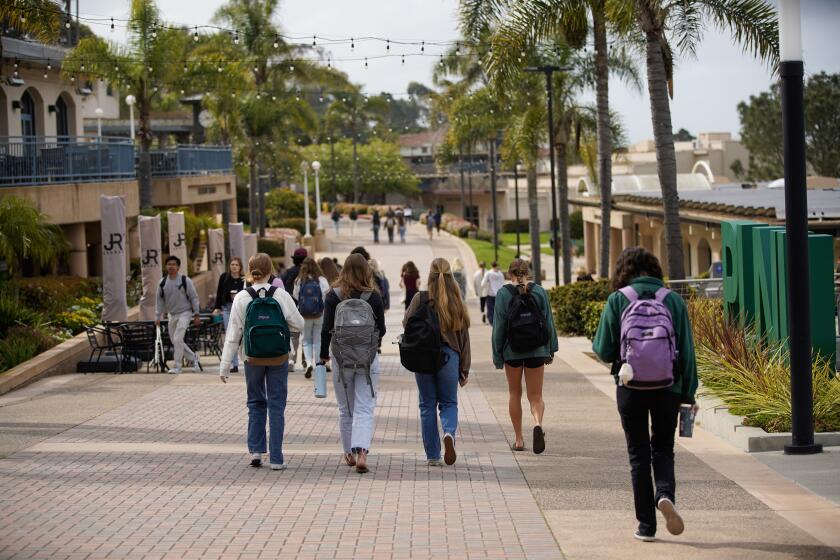Coronado schools seek $29 million bond
The lawn signs are up, websites have been launched, and the line in the sand is being drawn in this tiny seaside town as supporters and opponents square off over a $29 million school bond proposal on the June 3 ballot.
Trustees of the Coronado Unified School District voted in March to place Proposition E on the upcoming ballot. District officials say if the measure passes, the funds will be used on facilities, equipment and technology in the five-campus district that will help maintain manageable class sizes and prepare students for college and good-paying jobs in math, science and technology.
Coronado Superintendent Jeffrey Felix said the funds generated by Proposition E would protect the high quality of education in area schools that are now a “casualty” of the state’s Local Control Funding Formula, or LCFF. Under that new method of distributing state education money, revenue Coronado counted on to restore the district to pre-California budget crisis funding levels has been diverted to school districts with large populations of English learners, students from low socio-economic families and foster children, Felix said.
Felix said he has no problem with a student-weighted funding formula, but the timing of it “at the tail end of a five-year recession” couldn’t be worse for districts such as his. Coronado doesn’t qualify for supplemental grant money within LCFF.
“We understand the needs of these children, but we lament that the state has chosen to fund their needs on the backs of Coronado’s deserving kids,” Felix wrote in a news release announcing the bond proposal. “Without approval of this measure, our award-winning neighborhood schools will be decimated.”
Some Coronado homeowners aren’t buying it. And they certainly don’t want to be taxed for it at $40 per $100,000 assessed value of their homes.
“I’m just convinced they (the district) not only don’t need our money, but they are wasting it when they do get it,” said longtime Coronado resident Jim Newhall. “They are not being good stewards of our money. We have a lot of different examples of that.”
In records he has seen, Newhall questions the $4.1 million spent by the district over the past 27 months for professional consulting, a $241,000 price tag for pizza delivery, $3 million for computer leases and $1.7 million for computer service and repairs, among other expenses. He says he and other Coronado taxpayers have asked to see all the district’s financial statements, a request that has gone unheeded, he said.
“We can’t get any details,” said Jerry Toci, another longtime Coronado homeowner. “This is very frightening. “We don’t know how much they are actually borrowing. We have no idea of what it will cost to repay or how long, and we don’t know what the money is going to be used for.”
Over the past five years, the Coronado school district has maintained a balanced budget through larger class sizes, budget cuts, one-time federal grants and dipping into reserves, Felix said. The 3,200-student district’s operating budget is about $28 million for the current academic year and $28 million for next year.
A 55 percent vote is required to pass the general-obligation bond. As of March 2, there were 10,554 registered voters in the city of Coronado, according to the San Diego County Registrar of Voters.
In November, True North Research conducted a telephone poll of more than 400 likely Coronado voters. It revealed that 69 percent were amenable to a $90 million bond to help generate money for district schools.
Typically, school bonds are designed to pay for big projects with a long life expectancy, such as a new school or stadium, and they can take decades to mature. Coronado says it wants to take a different tack that includes:
• Individual bonds issued with terms less than 5 years to reduce costs.
• The total value of all bonds issued not to exceed $29 million. District leaders have determined this amount will cover the anticipated funding problem over the next 10 years, and not beyond.
• Not issuing new bonds if they will cause total annual payments to exceed $3.3 million.
• Paying off all bonds by Sept. 30, 2024 so as not to burden future generations.
Bond proceeds would be used to fund renovation of existing classrooms and other school facilities and free up the district’s general fund by paying or prepaying lease-purchase obligations.
No bond money would be used for administrative salaries.
Board President Dawn Ovrom said the proposal is a creative solution to a crisis that is real.
“We cannot cut our way out of this without decimating the quality of our education,” she said. “This measure includes innovative taxpayer protections that make it arguably the most prudent of its kind anywhere in California.”
Felix said the bond’s taxpayer protections should please the community. Also appealing, he said, is the fact the state could not touch the bond proceeds and it requires an independent citizen’s oversight committee.
“That seems to hit a good nerve for Coronado,” he said.
Get Essential San Diego, weekday mornings
Get top headlines from the Union-Tribune in your inbox weekday mornings, including top news, local, sports, business, entertainment and opinion.
You may occasionally receive promotional content from the San Diego Union-Tribune.




